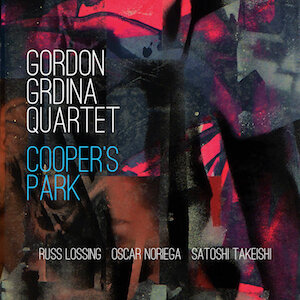Label: Teal Dreamers Factory, 2025
Personnel - Jacopo Ferrazza: bass, synths; Enrico Zanisi: piano, synths; Alessandra Diodati: vocals; Livia De Romanis: cello; Valerio Vantaggio: drums.
Italian bassist and composer Jacopo Ferrazza reunites the same qualified quintet from Fantàsia (2022) for his new conceptual album, Prometheus. The well-rounded program consists of eight original compositions, with Ferrazza leading with deep focus and crafting a cohesive narrative that unfolds through his imaginative compositional style.
“Prologue”, a vocalized, synth-driven introduction, sets the tone, segueing naturally into “The Cave”, where shadowy, dramatic piano chords intertwine with poignant arco work from bass and cello. Valerio Vantaggio's initially explosive drumming—reminiscent of prog rock—shifts into a cool, restrained groove, while Alessandra Diodati’s vocals command attention with a mix of dedication and abandon. Each band member plays a vital role in the track’s rich, multifaceted swagger.
Diodati’s mellifluous, crisp vocals permeate the title track, which begins as a slow waltz before evolving into a freer, meter-shifting exploration midway through. “The Rediscovery of Fire” ignites with an intense epiphany—ethereal chants floating over a thunderous rhythmic foundation that pulses like a dance machine. This same concept carries into “Titan Rises”, leading to a warped, industrial-like surge of synths and effects. The former piece also features a lyrical middle section where cello and bowed bass interact, before the initial intensity returns, now underscored by Enrico Zanisi’s hypnotic circular piano motif.
Ferrazza’s bass melodicism is at the forefront of “Pillory”, a lyrical 3/4 piece infused with a quiet mysticism. With his bass being the glue that holds everything together, the piece closes beautifully with a sustained high-pitched note, courtesy of Diodati. In contrast, “I Am Everywhere” pulses with rhythmic urgency, featuring a throbbing motion and precise unisons between voice and keys. We sense this salutary disentanglement in Zanisi’s piano solo, casting warm and sunny jazz hues onto the horizon.
Prometheus, Ferrazza’s fifth album as a leader, is a contemporary musical adventure that takes you to strange places. It may not appeal to all tastes, but those who embrace its journey may find themselves captivated by moments of mythic beauty.
Favorite Tracks:
04 - The Rediscovery of Fire ► 06- Titan Rises ► 08 - I Am Everywhere








































